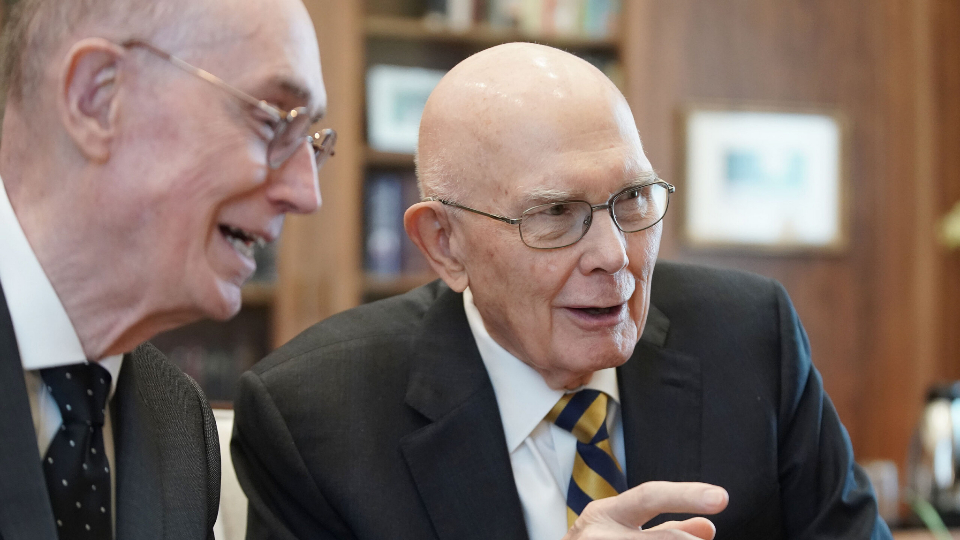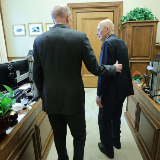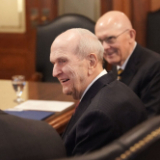| Temple Square is always beautiful in the springtime. Gardeners work to prepare the ground for General Conference. 2012 Intellectual Reserve, Inc. All rights reserved. | 1 / 10 |
This story appears here courtesy of TheChurchNews.com. It is not for use by other media.
By Sydney Walker, Church News
Last year the Church News published a series titled “Inside Church Headquarters.” The articles, podcasts and videos in the series highlight the council system of The Church of Jesus Christ of Latter-day Saints, including the Council of the First Presidency, the Council of the Quorum of the Twelve Apostles and the executive councils that oversee the work of temples and family history, missionary, and priesthood and family. The series also looked at how revelation in councils can be applied in stakes, wards and families.
Following is a transcript of an interview with President Dallin H. Oaks and President Henry B. Eyring of the First Presidency on what they have learned about revelation in councils.
1. Why is the Church of Jesus Christ governed by councils?
President Oaks: Let me begin by saying when the Prophet Joseph Smith was called, he taught the world, and he taught all of us for the first time, that the first principle about the plan of salvation, is that our Heavenly Father introduced it in a great council in Heaven. So as Latter-day Saints, we begin with councils in the plan of salvation.
2. What is the strength of councils?
President Eyring: The strength of councils comes largely from the faith of the people who are in them. If they together feel that the Lord has something He wants done and they don’t know yet what it is, there’s a chance that, together with their faith, they can find out the Lord’s will. But it’s not really decision making. They are a revelatory group if it works the way it’s supposed to work.
The man I am sitting with is a great example. Every time an issue comes before the First Presidency, it is fun to see him [President Oaks] come at it slightly differently than I do. And then after we’ve talked for a while, we always come out at the same place.
President Oaks: Exactly. That’s a wonderful explanation of how a council works. If we have the freedom to speak what is on our mind —
President Eyring: And if the other people are listening, with the thought that “He might actually have something from the Lord that I don’t have yet” or “Oh, maybe there’s a way to blend the two” —
President Oaks: Then the process ends in unity and unity comes from the Lord. It’s the way the Lord blesses us. Whether it’s a marriage or a Young Women presidency or an elders quorum presidency, these are all examples of councils that we deal with. We seek revelation, we come to unity, and we qualify for the blessings.
President Eyring: Yes. We always come together, by the way, with different backgrounds. When we look at an issue, I know he’s been a judge and a great lawyer, and he’ll see some things that I can’t see. And it’s interesting, he will often say after a meeting, “Well, we came at it differently, and we came out together at the end.”
President Oaks: That is true. It is a good description of how a council works. He sees problems and relevant facts that I didn’t even know existed. Then I apply my judgment and background, and when we get through, we listen to the Lord’s will through the one who presides in the council. That’s an essential part of the council.
By the way, not every council is a decision-making council. The First Presidency is a decision-making council. But some councils are discussion councils. After the process takes place that President Eyring has described, then the decision is not necessarily made in that council as by voting. Sometimes the purpose of the council is to inform the group who preside, like a bishopric in a ward council. And they may be of one heart and mind and announce the decision in the council. But it is perfectly appropriate and expected that they may say, “We will take this under advisement.”
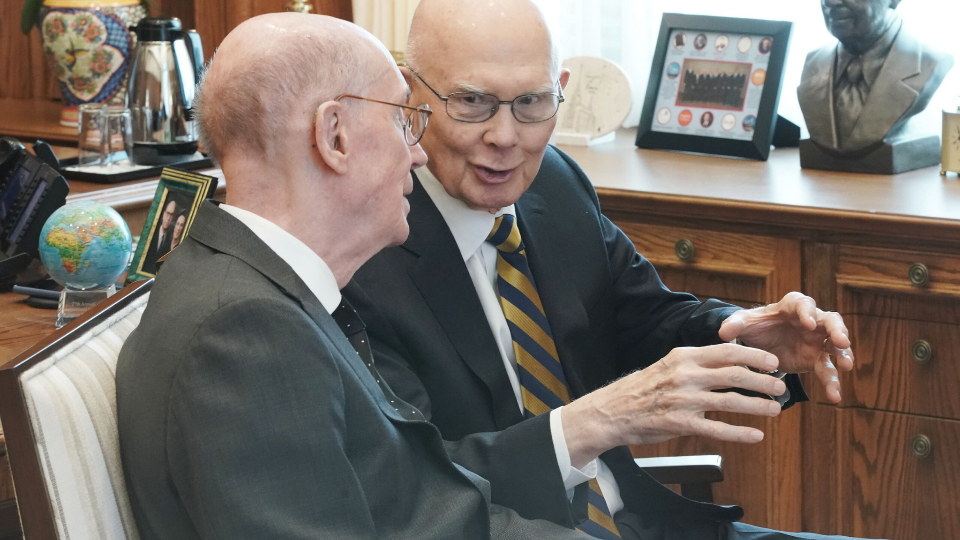
church-councils
President Dallin H. Oaks, First Counselor in the First Presidency, right, and President Henry B. Eyring, Second Counselor in the First Presidency, speak during an interview in Salt Lake City on Wednesday, June 16, 2021. Photo by Jeffrey D. Allred, courtesy of Church News.Copyright 2022 Deseret News Publishing Company.
3. What makes councils in the Church different from councils in secular settings? What is the difference between consensus and compromise?
President Eyring: In the Church, councils are about revelation. Consensus doesn’t mean I just have to agree with him. It has to be that I’ve listened to him enough that I said, “Aha!” It may not be the view that he or I had to begin with — it may be a joint thing that we’ve seen together.
President Oaks: It is true that revelation is the ultimate objective of the council, either revelation in the council, revelation to participants or revelation to presiding officers. And it is true that our councils function more with consensus than compromise.
Compromise implies that I have a position, he has a position. We negotiate. Each of us gives up something. On the other hand, the next step, and a better step, is consensus. We look for a way to agree on a total package. We don’t see ourselves giving up anything. We agree on a better solution than we came to the council with.
We may come to a consensus, but the Lord, through His servants, has something else in mind. Either this is not the time for decision or you need to consider it further or something else. So you can think of it as three levels.
President Eyring: By the way, the point that you’re making is that whatever the level, there is generally a decision-maker. I’ve seen the leader say: “I have a sense there’s someone in the room who has not yet settled. We’ll bring this back another time.” And that is interesting. I’ve seen it more than once.
President Oaks: That’s a case of revelation to the presiding officer overruling apparent consensus.
President Eyring: Yes, it looked like consensus. In fact, the first time I was ever in a meeting where the Quorum of the Twelve Apostles was assembled, I was an observer. I thought they had reached, after a lot of differences of opinion, a consensus. And the President of the Church, who was in the chair, said: “I sense there’s someone in the room who’s not settled yet. We’ll bring it back another time.” As they filed out of the room, one of the Brethren, a member of the Twelve, said, “Thank you.” So he had sensed that.
That’s a very high standard, by the way. The ideal would be that there would come enough consensus that it would be a decision-making group, in the sense that the Prophet could sense that that consensus was not just to get along, that it was they really had arrived at the same place.
President Oaks: Here’s another example on the same principle. This is something that I experienced when I was learning how to participate in a council. I was still in my late 20s. I’d been called as the second counselor in the stake presidency in the Chicago South Stake. In one of the very first meetings, the stake president said, “We need to build a stake center.” We had 12 or 13 units in our stake and only two had places to meet. And he said, “We need to build a stake center that would handle multiple wards.” That’s just part of the business of a stake. This was a large stake over 100 miles one way and 80 miles another. So the first question is, “Where do you locate it?” And he said, “I think we should locate our stake center in Naperville. What do you think?” The first counselor said he thought that was a good idea. And I said, “I think that’s a bad idea.”
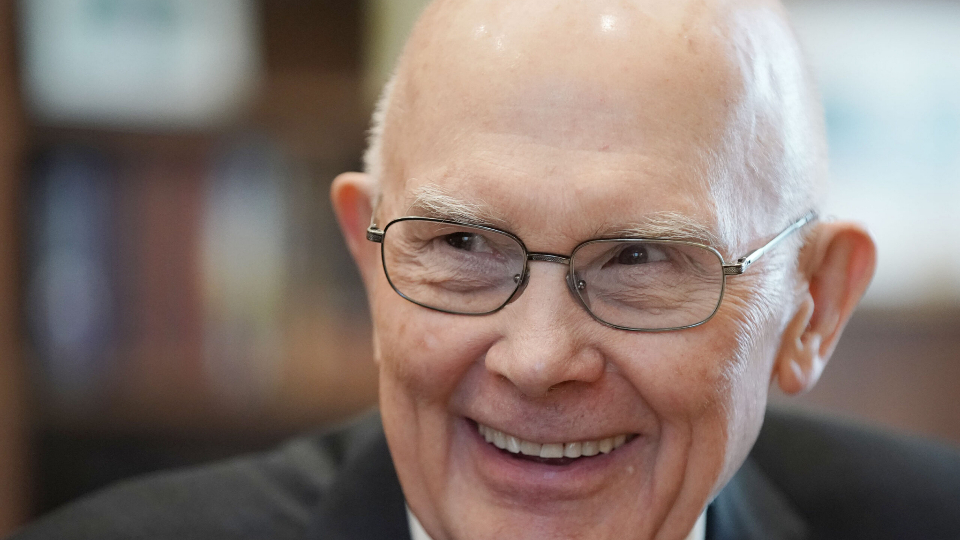
Church-councils
President Dallin H. Oaks, First Counselor in the First Presidency, speaks during an interview in Salt Lake City on Wednesday, June 16, 2021. Photo by Jeffrey D. Allred, courtesy of Church News.Copyright 2022 Deseret News Publishing Company.At our next weekly meeting, I signified that I was on board. The council had its purpose. Now the purpose of the council was to introduce a subject and to stimulate me to prayer. And with the benefit of revelation, I came in line. We had what the Lord wanted — unity. And a stake center was built. Yes, you’ll find it in the western suburbs of Chicago. And it’s not where I thought it ought to be, but it’s where the Lord wanted it.
President Eyring: Your revealed contribution was to be able to hear the answer, “You’re wrong.”
President Oaks: Yes, and it was very clear. See, that’s a result of discussion in a council. Councils don’t always produce immediate consensus or revelation. But they move the work forward.
President Eyring: In fact, the great leader of a council is very sensitive to that, not to try to force unanimity or consensus. But wait until it actually happens.
President Oaks: I was always grateful, thinking about that, that the stake president didn’t say, “Well, I think the Lord told me it should be in Naperville, and will you sustain me?” I would have said, “Yes.” I would have sustained him. But the process wasn’t complete.
4. Why is it important that the voice of every member of a council is heard?
President Oaks: Somewhere I heard the principle “in the abundance of counsel, there is wisdom.” Sometimes you have the persons together who can produce the result of counsel. And sometimes you just need to introduce the issue. Then that becomes a reason to ask for the opinions and insights of many others.
President Eyring: One of the advantages of having more people, of course, is if they did get the same revelation, then they’ll support the final decision more. So it’s one of the reasons that a great leader of a council waits, because if they can come to real, inspired consensus, then they’ll be much more supportive of getting it done. But if you push it to the extreme, and say, “Well, then, the more the merrier,” it’s hopeless, because it would take so long. Often it takes people a while.
In fact, we often reference the Council in Heaven. Remember how it came out? Heavenly Father presented His plan. And, in fact, they not only didn’t get consensus, but a third bailed out. I don’t think the Council in Heaven was to get consensus. It was to give people the opportunity to know they had the chance. But that’s a different thing. Heavenly Father didn’t have that council to get opinions. He wanted to give people the opportunity to say “I accept” or “I don’t accept.”
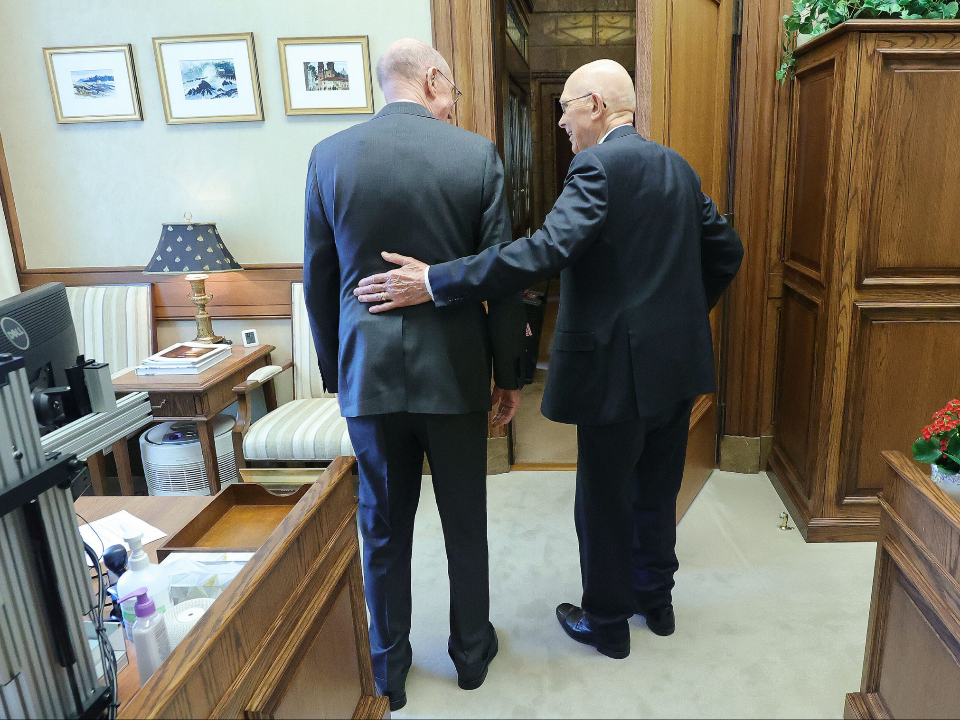
church-councils
President Dallin H. Oaks, First Counselor in the First Presidency, right, and President Henry B. Eyring, Second Counselor in the First Presidency, walk to their offices in Salt Lake City on Wednesday, June 16, 2021. Photo by Jeffrey D. Allred, courtesy of Church News.Copyright 2022 Deseret News Publishing Company.
President Oaks: Related to this question is something that I’ve looked on with wonder and desire for further understanding. The Lord has organized His Church in a particular way, and that way gives rise to councils whose composition He has prescribed. But it’s His way, and we conform to His way, and we don’t always understand the reasons for it. One of the interesting things is that at the top of the hierarchy in the Church is a council of three. And the next level is a council of twelve. And then as you proceed to other organizations in the Church — like a bishopric is three — and I can see the wisdom in it. But we haven’t been given the reason, we just have been given the pattern.
President Eyring: It’s nice for us to say, “We don’t know yet all the reasons why the Lord does it the way He does.”
5. What have you learned from President Russell M. Nelson’s leadership as you have served with him in the Quorum of the Twelve Apostles and now in the First Presidency?
President Oaks: I sat beside President Nelson for about 34 years before he was called to be President of the Church and I was called into the First Presidency. In the Quorum of the Twelve, President Nelson was a member of the Council of the Twelve Apostles. He was not the decision-maker. And what I’ve learned serving with President Nelson is that he is a different man when the mantle of the Lord settles upon him, and he becomes the Lord’s Prophet, the President of the Restored Church, and the ultimate decision-maker in the Church. I see him making decisions and giving counsel in a far different way than I saw in 34 years of sitting beside him in the Quorum of the Twelve.
President Eyring: May I say that I’ve served in three First Presidencies, and that each President did it differently. But what they had in common was a feeling of tremendous regard for their counselors and seeking their views. All of them. Very different men, very different styles. Some of them gave us specific assignments, and some didn’t. What they had in common was they had tremendous regard for seeking our counsel. Not that I think they needed it. I never had the feeling that we made that much difference, but they were very, very good. President Nelson is just remarkable in that. If you don’t speak, they’ll say, “Hal, you’ve got something on your mind. What is it? Speak up.” They all would do that.
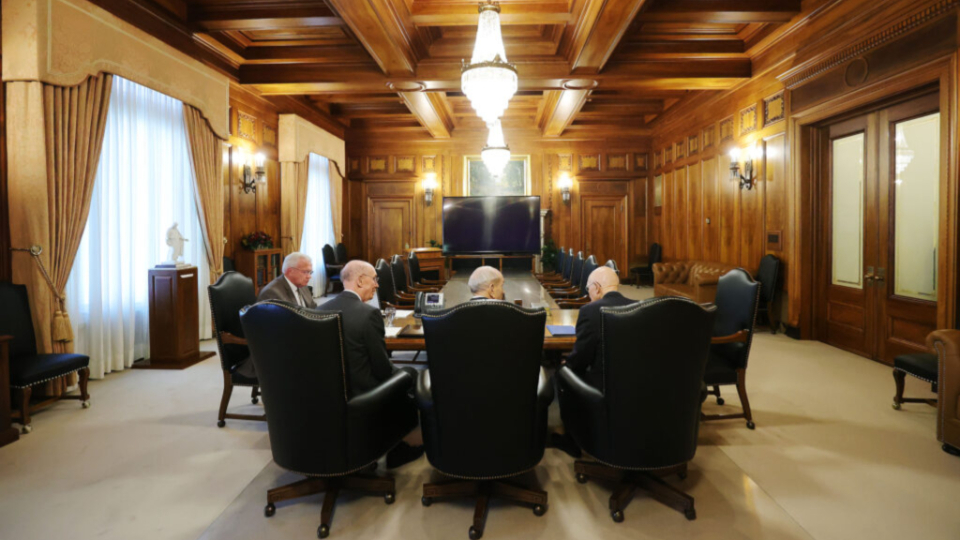
Church-Councils
President Russell M. Nelson of The Church of Jesus Christ of Latter-day Saints and his counselors, President Dallin H. Oaks, first counselor, and President Henry B. Eyring, second counselor, attend a First Presidency meeting, held daily Tuesday through Friday, at the Church Administration Building in Salt Lake City on Wednesday, June 16, 2021. The Church Administration Building was constructed between 1913 and 1917. Photo by Jeffrey D. Allred, courtesy of Church News.Copyright 2021 Deseret News Publishing Company.
6. What other leadership qualities can help councils work well? What can the presiding individual do to help the council run smoothly?
President Oaks: Well, one thing is respect for the members of the council. President Eyring has described that very well. Another thing is an understanding of principles of councils, because a principle of a council is that all should have the opportunity to be heard. Now, people have to be considerate of that, oftentimes, especially in a council with larger numbers. The better part of wisdom is to refrain from stating your opinion on every ticky little detail and reserve the time for that which will genuinely contribute to the outcome and to the revelation we seek. In the membership in the council, respect for time, and in the presiding officer, a regard and a respect for the individuals who are there — those are important.
President Eyring: And then, of course, we’ve said it so many times, it works only if they listen to each other, with the anticipation that they might learn something. That’s true of the leader and every member of the council. Listen, and be open to the possibility that through someone else’s experience and point of view, the Lord might reveal His work more clearly to you. It makes it hard, by the way, to get real unanimity because it takes time.
I think another point is that what you bring before the council ought to be something where that can happen. If it’s so complicated, in such a long list, an agenda of 30 things, you’re not going to get very much done. You have to keep the agenda focused enough that there’s a chance for everyone to bring to their feelings and try to get revelation. So the agenda makes a lot of difference.
President Oaks: President Eyring makes a very important point. I’ve often thought that the effectiveness of the council is dependent, in large measure, on the chairman fixing the agenda in a reasonable way and sticking with it.
President Eyring: I’ve been on four high councils in my life, and sometimes around 11 o’clock at night, I’d say, “I wonder if we had to talk about quite so many things.”
President Oaks: I’ve sometimes made that same point in council — I’m talking now about stake presidency and high council — I’ve sometimes made that point by saying, “It’s 11 o’clock now, and my experience is the Spirit of the Lord leaves about 10 o’clock. Isn’t it a good thing to postpone?”
President Eyring: The agenda makes a lot of difference and the ability of the leader to allow people to speak, and then to stay with it long enough to get the true consensus, which is joint revelation.
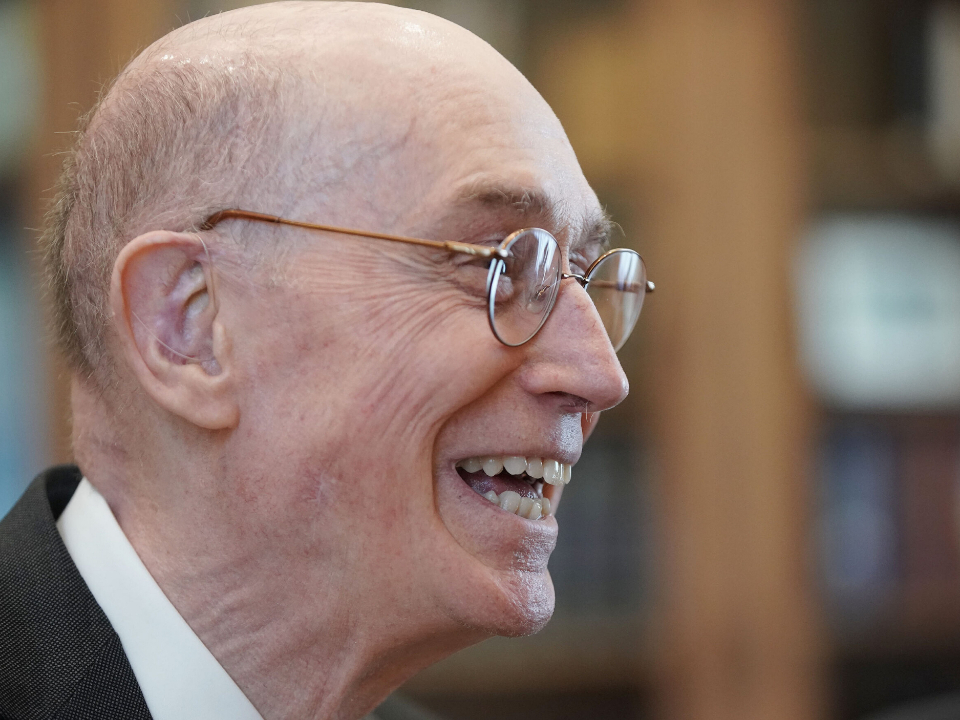
Church-councils
President Henry B. Eyring, Second Counselor in the First Presidency, speaks during an interview in Salt Lake City on Wednesday, June 16, 2021. Photo by Jeffrey D. Allred, courtesy of Church News. Photo by Jeffrey D. Allred, courtesy of Church News.Copyright 2022 Deseret News Publishing Company.
7. This counseling pattern that governs everything at Church headquarters can also bless and strengthen families. Can you talk about the strength of counseling in families?
President Oaks: The principle of counseling is nowhere more important than in the relationship between a husband and a wife, and in their relationship as parents to their children, or anyone else who may in an extended family be living with them. The principles we’ve talked about on seeking for revelation, on governing the agenda so that it’s reasonable, and seeking to hear from everyone, defining clearly what the discussion is about, which is a function of who presides, those all apply with just as great an importance in the family as they do in any Church organization.
President Eyring: I love this question because let’s be honest, a family council depends on the age of the children. There are real limitations on how much we can achieve this ideal we’re talking about with a family. But listen to people and listen to each other and respect each other. And it’s true, with a husband and wife, do they listen to each other and have faith? Eventually, the decision has to be made, and the children may not have bought into it. I think a family council is a real challenge, to achieve the very thing we’re talking about, particularly with, “I’ve got three teenagers and two little children, and now we’re going to have a discussion that’s going to get joint revelation.” That’s a little bit of a challenge.
President Oaks: The commandment to honor thy father and thy mother is an important commandment for family councils. And let’s remember that quite a few family councils have to be handled by a widow or a widower or a divorced person. And all of those call for modifications, and honoring parents is a very important part of it.
President Eyring: I think the ideal of counseling is applicable to the family, hard to make it happen, yet you should try. Try to have the spirit of a council as much as you can have it. The idea of sitting down with your teenagers and, “We’re now going to have a council” — I think it’s better if it just happens, as opposed to saying, “Oh, I’ve called a meeting.”
President Oaks: The best councils we ever had with my teenage children were around the dinner table. We had a rule that everybody would be there for dinner and exceptions had to be cleared with the parents. We would never have television going, never have a radio going. Now, it would be no cellphones going. That was a time when the family gathered for something pleasant. We didn’t have the same formality you might have in another kind of council, but we got more things done at dinner than in formal council.
President Eyring: In fact, our dinners were very interesting. There was a free exchange of ideas in my family so much that when I got in the Presiding Bishopric with Bishop [Robert D.] Hales, I was his counselor, he said, “Where did you learn to talk about things with such intensity?” I said, “It was around the dinner table at home.” But it is true that the family table is where you’re going to find out how much you can really work together and counsel.
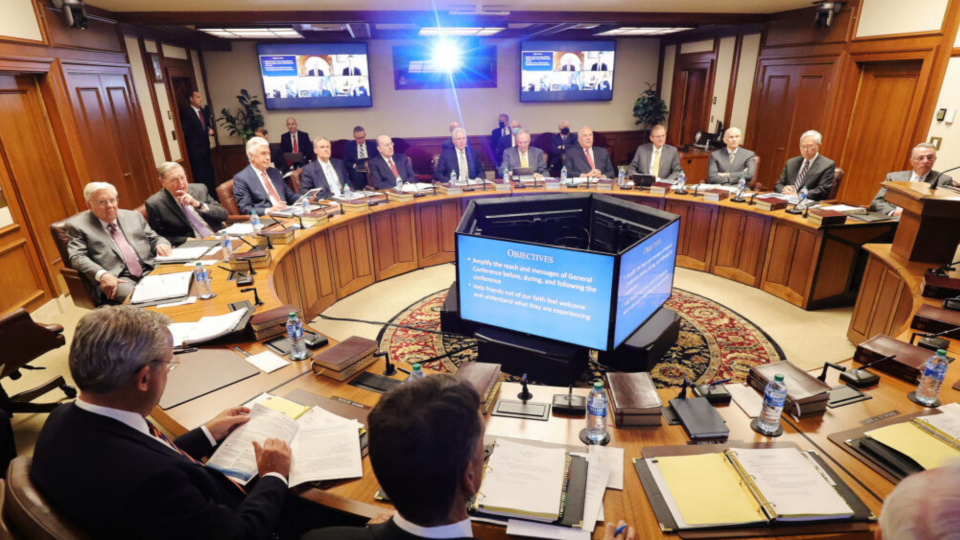
Councils-part-2
The Quorum of the Twelve Apostles of The Church of Jesus Christ of Latter-day Saints gather for their weekly meeting at the Church Administration Building in Salt Lake City on Tuesday, May 11, 2021.Copyright 2021 Deseret News Publishing Company.
8. What is the Savior’s role in councils?
President Eyring: The ideal would be that He’s directing every council. That’s the thought you’d like to have in the council. You hope the leader would feel that, and every member would say, “If this is a matter of substance, this is His council, and let’s find out what His view is.” That’s a little idealistic, but I believe that’s the true answer to your question.
President Oaks: That’s a great principle. We don’t have any scriptural teachings that I remember that are directly applicable to counseling together. What we know most about the Savior is the fact that He taught. For example, in the Book of Mormon, it’s quite clear in 3 Nephi, that there are certain things He taught to those He called into the Twelve. Then He turned to the multitude and taught them. And that is indicative somewhat of principles of counseling. He didn’t tell everyone what He chose to tell those who had been called to a certain position.
President Eyring: And let me just say another point. I really think He does have an opinion on everything. Remember, the Savior told Samuel to “write it down.” This shows a little detail, that what Samuel recorded, He had a view. I tend to think He’s probably that way about everything.
President Oaks: I think there’s another illustration of that in the Book of Mormon. There in frequent passages, He says He will give more to us when we have accepted what He has already taught us. There’s more that we don’t know. And so He has an opinion about when we’re ready for the additional knowledge He desires to give us.
President Eyring: I think my ideal of a council is to say, “Let’s do whatever it takes to find out what the Lord wants.” I think He has opinions about everything. And I think what we’re trying to do is find out what He’d like done.
President Oaks: Also, He has knowledge of everything and the future, so we’re seeking to fit into that plan. President Nelson has often spoken of the covenant path. And we know that children of God are in different places on the covenant path. Some are out in the weeds, some are well along the path, some are just getting on the path. And that’s part of the function of councils, to help people at different points on the covenant path.
President Eyring: I view it that way. Others may not see it that way, but I do. It also makes me very cautious. When I was a member of the Twelve — I was the junior member of the Twelve probably longer than anyone in this dispensation — when they would come to decisions, they would start with the junior person and say, “What is your position?” And so for years, I would say, “Oh, I hope I come up with the right answer” because I couldn’t tell from the conversation yet where the senior Brethren were. I thought, “Oh, bless me that I might not be the one that didn’t get it.”
So it’s not easy. It’s hard work to get the Lord’s will. And councils, if we go at it, are the best way we know of to get it done.
Copyright 2022 Deseret News Publishing Company.
